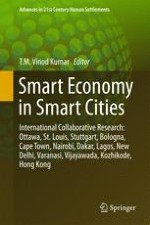2017 | OriginalPaper | Buchkapitel
13. Holistic Value Model for Smart Cities
verfasst von : Alanus von Radecki, Satyendra Singh
Erschienen in: Smart Economy in Smart Cities
Verlag: Springer Singapore
Aktivieren Sie unsere intelligente Suche, um passende Fachinhalte oder Patente zu finden.
Wählen Sie Textabschnitte aus um mit Künstlicher Intelligenz passenden Patente zu finden. powered by
Markieren Sie Textabschnitte, um KI-gestützt weitere passende Inhalte zu finden. powered by
